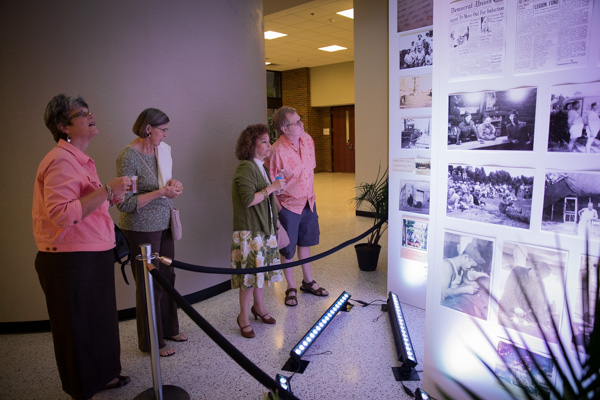In remembrance of the 70th Anniversary of World War II, several gathered Thursday evening in Lipscomb’s Stowe Hall to dedicate a forgotten chapter of Tennessee’s history.
Almost 400 letters written by German prisoners of war to their Tennessee second family were translated and are now archived at Beaman Library.
“These letters are not a story of war,” history professor Dr. Tim Johnson said. “This is the story of amazing reconciliation — a story where if you take away the hate and the politics of war, you find a story of human beings talking and conversing with one another, finding relationships.”
Speakers at the “From Foe to Friend” event included Johnson, German professor Dr. Charlie McVey, sophomore German exchange student Ines Konschewitz and Curtis Peters, the man who donated the letters.
Late in the 1980s, Peters’ sister-in-law, Lynn Pettus, discovered the letters stuffed away in an old Corn Flakes box in a closet of their family home.
“I first thought they were love letters,” Pettus said, remembering her great aunt’s love affair from years prior. “Low and behold, they were in a different language and we later discovered they were from the German prisoners who were here during the war.”
Many of the POWs worked on property owned by the James Henry Stribling and Brock families. The men cut timber and plowed fields, growing closer with the Brocks as they shared cold milk together in the heat of several afternoons.
Each letter sent after the war detailed the lives of the former prisoners. The men would write to the Brocks, thanking them for their hospitality and sharing stories of life in post-war Germany.
The Brocks would respond by sending clothing, laundry supplies and other necessities often difficult to purchase in Germany. One year the family sent a pack of cigarettes to one of the men as a late Christmas present.
“This is not military history — this is cultural and social history,” Peters said. “The generosity of the host country [and] the hospitality of the people of Lawrenceburg made a lasting impression on these German soldiers.”
Before the men arrived newspaper headlines across Tennessee read “Nazis are Coming” or“Nazis have Arrived.” After a two-year time period, when the prisoners went back to Germany, newspaper headlines everywhere read“German Boys Went Home.”
“That ought to tell you something right there…that relationship, how they viewed them, changed over time,” Peters said.
In fact, the night before they left, a handful of prisoners slipped out of camp, walked two miles into town and knocked on the Brock’s door to tell them “Bye.’” They later walked the two miles back and slipped into camp as if nothing ever happened.
Early in 2013, as Peters stopped for breakfast in downtown Lawrenceburg, he ran into Johnson, who paved the way for the Lipscomb donation and translation by McVey.
McVey spent the summer researching and translating the letters in time for the 70th anniversary of the war’s end. The Tennessee State Library and Archives gave the university a $1,250 grant to help digitize the letters online.
“The words are fairly plain,” McVey said. “The needs are fairly simple, but the relationships that underlie these words are precious.”
German exchange student Ines Konschewitz assisted McVey in translating and transcribing the letters over the summer.
“These letters remind us of Jesus who has given us the commandment to ‘Love your enemies,’” Konschewitz said. “I underestimated the power that this love has and the fruit that it can produce, of hope and joy in a time of hardship and of war.”
Several newspaper clippings, photos and letters are on display in the Swang Business Center. The rest of the letters have been archived online and the original paper copies are available in the library.
“Because of the deep connection the Germans felt toward the Stribling and Brock families, they wrote letters,” said Special Collections Librarian Elizabeth Rivera. “Now, these letters are a permanent and primary resource that is open and available to the public.”
Photos by Erin Turner

